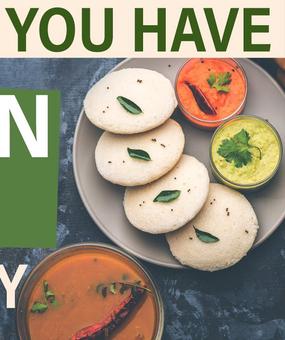What would you choose? A general diet plan that contains all the required nutrition but may or may not agree with your system or healthy, natural and tasty food that agrees with your palate?
This seems like a simple enough question, right? Naturally, the second option sounds like it has all the select ingredients of the superior choice! Strangely though, on a daily basis, most of us choose the first option.
Of course, you don’t believe that this is what you are doing. After all, you include rotis, rice, dal, green leafy vegetables, fruits, nuts, milk, curd and water in your diet. You have, painstakingly, ensured your body gets each nutrient and this should lead to good health, right? Unfortunately, it may not.
The problem is that the general diet that you choose may not be the optimal one for your system. This is because each of us have unique requirements, imbalances as well as different metabolic rates.
So, how can you make the best choice that takes all of this into account?
This is the role that a naturopathy diet plays in your life. Naturopathy is, literally, as old as the Vedas, which is estimated to be between 3,500 years old! There are references to natural medicine in the Atharva Veda. However, it has gained attention once again only recently. This is because of the lifestyle and diet-related disorders that are sprouting up amongst us.
Here are some FAQs that can help clear your doubts and satisfy your interest in naturopathy treatment and a diet based on it.
1. What is naturopathy?
It is a system of medicine that believes in treating conditions/diseases by balancing the five elements (air, water, fire, earth, and space) present in our body. It is non- invasive and painless.
The treatment supports your body, enabling it to harness its innate ability to heal itself without using medication. The ‘medicines’ take the form of food combinations, natural herbs, customized diet and healthy practices. You are encouraged to eliminate habits such as smoking and drinking alcohol, among other things.
2. What kind of illness or condition can naturopathy cure?
- Naturopathy treatment is not symptomatic in its approach. Therefore, anyone, healthy or not, is welcome to approach a naturopath – to improve or maintain health.
- Naturopathy works best as a preventive treatment. It does not claim to cure acute conditions such as broken bones and heart attacks, but it can help prevent them. Moreover, it has even been effective in supporting the treatment of cancer. For example, chemotherapy, buoyed by nutrition therapy, has helped people overcome the disease.
- Naturopathy is, also, the best solution for chronic ailments such as diabetes, hormonal disorders, and hypertension. It can, successfully, help people with these ailments because it targets the root cause of disorders rather than only treat the symptoms.
At the end of the day, continuously popping pills can lead to severe side-effects; it would be sensible to opt for a natural way to heal yourself. Imagine cutting down on those periodic visits to the doctor to adjust your medication. Instead, you could be in charge of your health by controlling your diet!
3. What part does diet play in naturopathy therapy?
Diet is an integral part of this therapy. There are three body constitutions – vata, pitta, and kapha. Based on your constitution, a naturopath uses various tools to treat you. One of them is diet.
Eating foods that do not suit your constitution causes adverse conditions in your body. The diet plan sets right these imbalances, bringing your body to its original and healthy state.
For example, 25-year-old Shankar (name changed) was diagnosed with diabetes with a fasting sugar level of 240. After trying a variety of treatments to control his condition, he turned to naturopathy for treating his diabetes. This is what he had to say. “After undergoing a 10-day treatment, where I followed a naturopathy diet, my fasting sugar level reduced to 140. After another six months, it dropped to 101-102 levels. Since then, I have discontinued my medication and stuck to the prescribed diet!”
Of course, it is important to remember that each person’s body responds uniquely.
4. How can a naturopathy diet help me?
The ‘medicine’ that is conventionally prescribed to you to overcome your innate deficiencies is present in the naturopathy diet that is conceived for you.
What the naturopathy diet does for you is that it ensures that your innate imbalances are taken care of. These imbalances are the source of your aversions and cravings.
For example, let’s say you have a calcium deficiency. Your diet will include foods high in calcium and combinations that will help its better absorption in your system. This is better than, say, taking calcium supplements in the form of pills.
Additionally, a naturopathy diet takes you back to the roots, where food is in its pure and natural form sans additives, colors, preservatives, chemicals and genetic modification. This food will ensure you have more prana or energy in your system, making you feel light. This enables you to have clearer and purer thoughts. It also helps dispel your lethargy and weariness.
5. Can you suggest a good naturopathy diet for my specific condition?
Naturopathy does not have a standard one-size-fits-all solution or diet plan. Even within a family, each person’s requirements will vary.
Moreover, there isn’t a specific diet plan for each condition like one for diabetes, another for hypertension and, still, another for hormonal issues. However, adoption of this diet is likely to improve the quality of your life.
6. Will the naturopathy diet work for healthy people who are interested in, say, weight loss or elimination of acne?
Yes, the diet is customized to suit your body’s requirements depending on your prakruti or constitution. So, once your imbalances are corrected, your condition will resolve itself and settle down.
Your doctor may also suggest physical activities such as yoga, swimming or walking in addition to the naturopathy diet for weight loss and acne issues.
7. What sort of foods are generally found in a naturopathy diet?
A naturopathy diet includes foods that are as close to their natural state as possible. They do not contain additives, preservatives, or pesticides.
You may find these foods in this diet:
- Wholesome food like unpolished rice and millets
- Fresh fruits – preferably seasonal ones
- Steamed and boiled vegetables
- Green leafy vegetables and salads
- Herbs and spices
- Nuts, nut milks, and nut-based oils
- Oilseeds
- Dairy products (as per digestive capacity)
- Fermented food
- Salt in its natural form – rock or sea salt
- Natural juices with or without pulp (without color or sugar)
- Traditional preparations like laddoos using nuts, til (sesame seeds) and dry fruits
All foods that energize and nourish you are part of a naturopathy diet. The exact menu, naturally, differs based on each person’s constitution, cultural background, region, and traditions.
So, if you are from the North of India, your diet might include wheat-based preparations, khichdi, and lassi (buttermilk). On the other hand, a South Indian’s diet plan might include rice-based items like pongal and curd rice.
The same food that energizes you may tire others. For instance, some people claim that caffeine first thing in the morning keeps them going through the day; others opine that it makes them nauseous and acidic!
8. What food items, if any, should be avoided in a naturopathy diet?
- All sorts of processed products such as
a) White/brown sugar – Substitute it with palm sugar, coconut sugar, jaggery or honey.
b) Iodized salt – Use rock salt or sea salt in its natural form instead.
- Refined products such as white rice, maida (flour) and polished millets – Use red or brown rice and unpolished millet as substitutes.
- Oils and fried foods – Consider baked (using a traditional oven), dry roasted or sun-dried items instead.
- Only A2 ghee should be included, and even that, in moderation – about one and a quarter spoons a day.
9. Will a naturopathy diet alone help me achieve better health?
The naturopathy diet is a fundamental part of the naturopathy treatment. However, along with this diet, it is important to use other tools of naturopathy for complete health.
These could take the form of
- Herbs
- Acupuncture
- Acupressure
- Yoga
- Meditation
- Pranayama or breathing exercises
- Marma therapy – gentle touches on critical points (called marma points) in the body
- Meru chikitsa – light touches on the spine
- Water therapy
- Mud therapy – using the healing properties of mud to detoxify you
- Pratyahara – gaining mastery over external influences
…to name just a few!
A naturopath may use nadi pariksha (pulse diagnosis) and blood reports as well as detailed questioning, and examination, to determine the diet that best suits you. Since the naturopathy diet has been formulated keeping in mind your nature, you can eat your way to good health!
When you move away from your nature, it is called vikruti, and this is the source of unhealthy conditions. The closer you are to your nature, the happier you are – mentally, physically and emotionally; this is the ideal recipe for all-round wellness!
You may visit a naturopath at Sri Sri College of Ayurvedic Science and Research Hospital.
(Written with extensive inputs from Dr. Surya Ramesh, Naturopath, Sri Sri Ayurveda Hospital and Art of Living teacher)




















